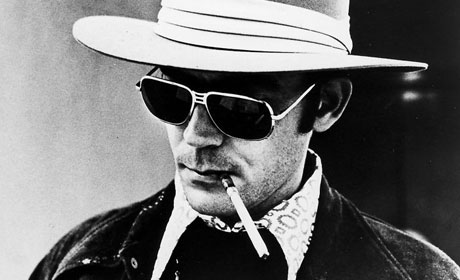Dorium Maldovar: So you’re going to do this, let them all think you’re dead?
The Doctor: It’s the only way, then they can all forget me. I got too big, Dorium, too noisy. Time to step back into the shadows.
This exchange between The Doctor and his associate Dorium is from the Doctor Who episode “The Wedding of River Song” and when I heard it for the first time, I immediately thought of Hunter. There are two reasons for that. First, part of me has always hoped that his suicide was one last joke on the world, that he would burst out of the shadows and laugh at us. I know that’s not going to happen but one can dream.
The other reason is core of the idea The Doctor is discussing, that he got too big for himself and his reputation was more dangerous than the reality. That is very true of Hunter, a man thoroughly trapped by the public image of Dr. Hunter S. Thompson the Gonzo journalist. His reputation was most dangerous to himself.
Like The Doctor, he needed to take a step back and disappear from the image he built.
Unlike The Doctor, he chose a much more permanent means of doing so.
Since his death, a plethora of books and documentaries have been released trying to understand the man, or, to be more precise, explain him. Some were created by professionals, peers, and confidants with true insight into him. Others were blatant cash grabs created by people who once met him at a dinner party for eight seconds and claim that makes them close. But of the documentaries and films, one of the best is Gonzo: The Life and Work of Dr. Hunter S. Thompson.
Directed by Alex Gibney and narrated by Johnny Depp, a Thompson friend and devotee, Gonzo is a rare collection of home movies, old interviews, and archival footage punctuated by some surprisingly insightful and unexpected interviews with politicians, authors, and those that dared to call him friend. It paints a picture that may be best described with one word; accurate.
Hunter was a talented writer who, by all accounts, split his time between being Dr. Hunter S. Thompson, the master of Gonzo journalism, and being Hunter, the friend and father. Unfortunately for Hunter, Dr. Thompson’s penchant for drug and alcohol ridiculousness slowly took over all aspects of his life. It’s a credit to the man behind the image that so many of his friends and cohorts came out to not only pay tribute to him but also to pull no punches. I doubt Thompson would have wanted it any other way. Gonzo journalism, the writing style he ended up developing and no one can truly duplicate, only emulate, was equal parts fact and fiction. So is this documentary, the two living in a perfect storytelling symbiosis that brutally eulogizes and lovingly vilifies him. From the music Gibney chooses to Ralph Steadman’s trademark art to Depp’s spot on narration, everything about this film screams Hunter S. Thompson, both the image and the man behind it.
If you are a fan of Thompson’s work, his persona, or are just interested in a man who atypically typified an era, Gonzo: The Life and Work of Dr. Hunter S. Thompson is necessary viewing.
